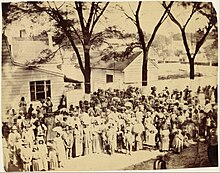 Emancipated African Americans in South Carolina, photographed at the Port Royal Experiment by Timothy H. O'Sullivan, 1862 | |
| Total population | |
|---|---|
| 1,428,796[1] (2017) | |
| Languages | |
| Southern American English, African-American Vernacular English, Gullah, African languages | |
| Religion | |
| Black Protestant[2] | |
| Related ethnic groups | |
| Gullah |
| Part of a series on |
| African Americans |
|---|


Black South Carolinians are residents of the state of South Carolina who are of African American ancestry. This article examines South Carolina's history with an emphasis on the lives, status, and contributions of African Americans. Enslaved Africans first arrived in the region in 1526, and the institution of slavery remained until the end of the Civil War in 1865. Until slavery's abolition, the free black population of South Carolina never exceeded 2%. Beginning during the Reconstruction Era, African Americans were elected to political offices in large numbers, leading to South Carolina's first majority-black government. Toward the end of the 1870s however, the Democratic Party regained power and passed laws aimed at disenfranchising African Americans, including the denial of the right to vote. Between the 1870s and 1960s, African Americans and whites lived segregated lives; people of color and whites were not allowed to attend the same schools or share public facilities. African Americans were treated as second-class citizens leading to the civil rights movement in the 1960s. In modern America, African Americans constitute 22% of the state's legislature, and in 2014, the state's first African American U.S. Senator since Reconstruction, Tim Scott, was elected. In 2015, the Confederate flag was removed from the South Carolina Statehouse after the Charleston church shooting.[3]